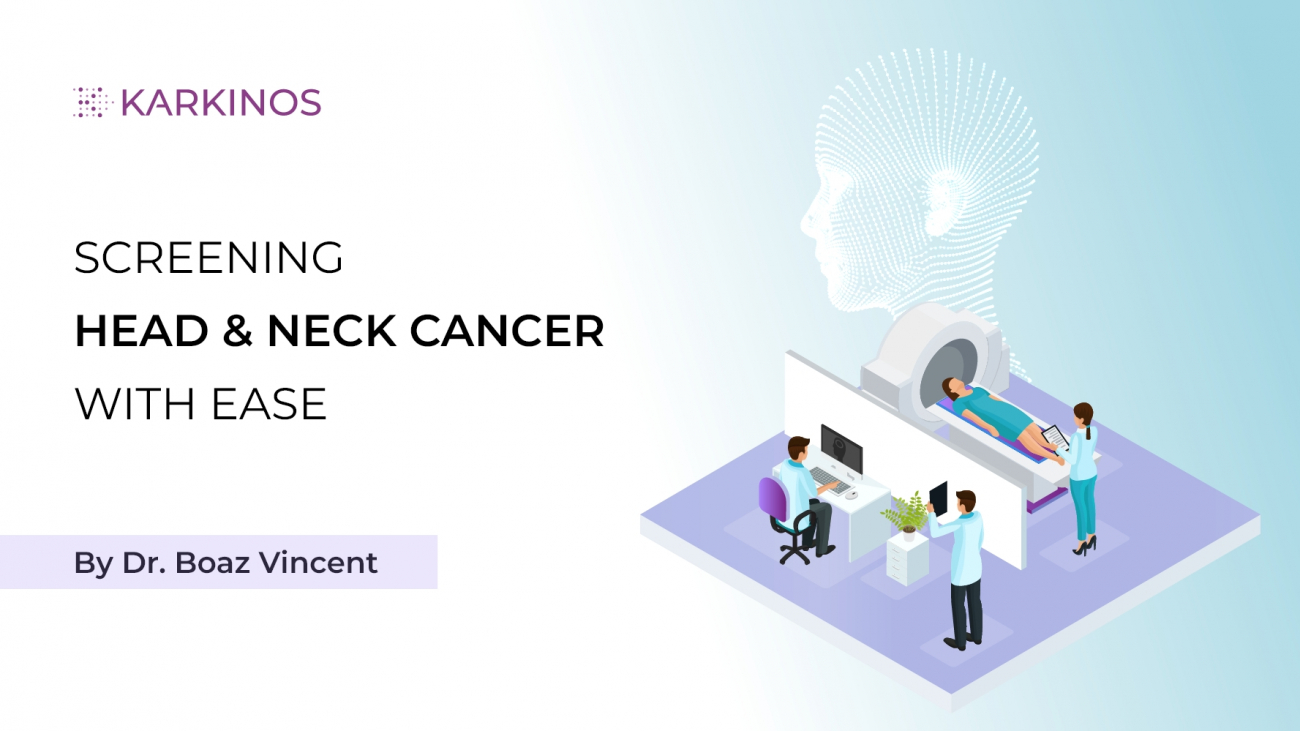Technology intervention improvises screening efficacy of Head and Neck cancers
By Dr. Boaz Vincent, Consultant Radiation and Clinical Oncologist, Karkinos Healthcare, Kerala
Head and neck cancer is a group of tumors that develop at various anatomic sites around the oral and throat regions of a human body. In India, head and neck cancer is a big bane. As India is home to a large population of tobacco and alcohol consumers, it is not uncommon for the incidence rate of head and neck cancer to be very high in our country.
Common in both Indian men and women, head and neck cancers usually begin in the squamous cells present in the nasal cavity, oral cavity, tongue, larynx, and pharynx, or in the cells lining salivary glands or paranasal sinuses. If the cancer is limited only to the squamous layer of cells, it is called carcinoma in situ. Beyond that it is referred to as invasive squamous cell carcinoma.
Sadly, India is recognized as the oral cancer capital of the world and it is among the top three cancers in India in terms of its incidence. In India, over 2,00,000 new head and neck cancers are diagnosed every year. Head and neck cancers make up almost 30% of cancers among Indian men and 11-16% of Indian women.
Risk factors causing head and neck cancers
These cancers are mainly caused because of chewing tobacco, betelnut, paan, smoking cigarettes and consuming excessive alcohol. Individuals indulging in excessive smoking and consumption of smokeless tobacco products and/or alcohol are at great risk of developing head and neck cancer. Viruses such as the Epstein Barr virus (EBV) and the Human Papillomavirus (HPV) , especially the HPV 16 genotype, have been known to cause cancer in the nasopharynx and tonsils and base of tongue (oropharynx) respectively.
Poor nutrition and poor oral hygiene are other risk factors that can predispose cancer of the head and neck. Research indicates that genetics and family history also play a role in some of these cancers. Individuals with a weak immune system, frequent exposure to radiation, and individuals with a history of gastroesophageal reflux disease (GERD) and laryngopharyngeal reflux disease (LPRD) are at an increased risk of head and neck cancer.
Head and neck cancer symptoms
- Pain in the throat, neck, ear, or mouth
- A lump in the neck
- Red or white patches on the gums, tongue, or buccal mucosa
- A sore in the mouth that has not healed for few weeks
- Change in voice, hoarseness while speaking
- Difficulty in chewing and swallowing
- Bleeding, pain, or numbness in the nose or mouth
- Difficulty in opening the mouth
- Poor fitting dentures causing discomfort
- Blocked sinuses that are not cured by antibiotics
- Paralysis of the face muscles and swelling under the chin and jawbone
Screening, diagnosis, and treatment
The survival rates of Head and Neck cancers, especially oral cavity cancers, vary drastically based on the stage of cancer or the extent of its spread. Certainly, head and neck cancer can be prevented and cured if detected early. Screening usually is done by dentists or ENT doctors. A systematic Oral Visual Examination (OVE) is normally done to look for any abnormal lesions in the mouth, throat area and also for any indicative symptoms for premalignant conditions such as leukoplakia, Erythroplakia, etc.
Leukoplakia is a condition in which one or more white patches or spots (lesions) form inside the mouth. Erythroplakia, on the other hand, appears as abnormal red lesions on the mucous membranes in the mouth. The possibilities of these pre-malignant conditions developing into oral cancer is very high. As oral cancer is often preceded by a premalignant lesion, it is best for high-risk individuals to undergo periodic screening that can help in the early detection of leukoplakia.Post preliminary screening, a thorough physical examination of the mouth cavity and throat is advised. The lymph nodes in the neck may be enlarged. In case of any suspicious growth or lesions, a tissue biopsy is performed. Based on the symptomology, the screened patient is advised to proceed for tests like, CT scan, PET scan, MRI, biomarker testing of the tumor,and endoscopy to determine the extent of spread of the cancer.
Treatment for head and neck cancers is multimodal, requiring a multidisciplinary team of doctors (head & neck onco-surgeons, neurosurgeons, reconstructive surgeons, dental surgeons, radiation oncologists & medical oncologists, radiologists, pathologists, and palliative care physicians). For this reason, Karkinos Healthcare’s panel of doctors on the Tumor Board sit together to address all the dimensions of treatment for the best outcome.
The treatment offered depends on the location of the cancer, the stage, the patient’s age, and their overall health. Usually early stage cancers will require surgery and locally advanced diseases require adjuvant radiation. Nowadays, Organ preservation approach is practiced especially in laryngeal cancers. In head and neck cancers, the oncologists and the team of other doctors generally take the responsibility to ensure that the patient is not only treated but the patient’s appearance is maintained, as the surgery for some can be disfiguring, and also Quality of Life (QoL) is sustained.
Digital cancer care companies like Karkinos Healthcare are laying a lot of emphasis in deploying digital technology to offer end-to-end services for every patient.
Diagnosing and treating head and neck cancers in the digital era
Digital cancer care companies like Karkinos Healthcare are laying a lot of emphasis in deploying digital technology to offer end-to-end services for every patient. To deliver evidence-based treatment options that are backed by strong health data analytics, digital oncology companies are constantly working in tandem with oncologists to improvise the efficacy of screening methods, especially in oral cancer. In the last few years, cancer treatment has become more personalized. Tailored treatment plans are deduced with a patient centric approach to care. Patients now have access to information through m-health platforms and these platforms help bridge gaps between the physician and the patient, ensuring there is no loss of response time in caring for the patient.
Apart from personalization, awareness on cancer screening is becoming more pronounced, not only in urban India but also in semi-urban and rural parts, where the resources are low. This is where digital Point of Care (PoC) devices are extensively used, especially in oral cancer screening. Imaging through digitally-led hand held devices allows diagnosis to be taken closer to the patient and the convenience of mobile imaging is proved to be beneficial in low-resource settings. These images when uploaded on a digital platform can be made accessible to oncologists or onco-surgeons through telemedicine platforms to provide timely and appropriate diagnosis. As early-stage diagnosis is a crucial step in reducing the mortality rate in oral cancer cases, PoC devices for oral cancer diagnosis hold great future potential in improving the survival rates as well as the quality of life of oral cancer patients.
In addition to actively deploying PoCs, Karkinos Healthcare is also stressing on patient data analysis. The analysis is critical in understanding India-specific cancer incidence. This understanding is critical because data-backed research can lead to evidence-based personalized medicine, which in turn results in better treatment outcomes. The ultimate goal is to early detect head and neck cancers, stop the spread to other sites of the body and finally help save a life or help maintain Quality of Life.

 About Dr. Boaz Vincent, MBBS, MD, DNB
About Dr. Boaz Vincent, MBBS, MD, DNB